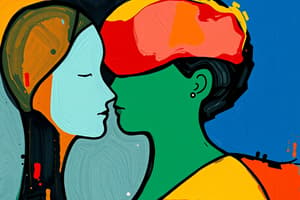Podcast
Questions and Answers
What is the primary definition of culture according to Leininger?
What is the primary definition of culture according to Leininger?
- Transmitted values, beliefs, and norms guiding a group's behaviors (correct)
- A person's racial or ethnic background
- An individual's personal preferences and tastes
- A blueprint for social interactions only
How does culture influence a person's approach to health and illness?
How does culture influence a person's approach to health and illness?
- It has no impact on health beliefs or practices
- It affects definitions of health, self-treatment, and reliance on healers (correct)
- It only determines when to seek help from professionals
- It only influences physical health outcomes
In what way does culture affect who cares for someone who is ill?
In what way does culture affect who cares for someone who is ill?
- It determines family roles only
- It allows anyone to care for the ill person regardless of relationship
- It shapes expectations about caregiving and who is suitable to provide care (correct)
- It is irrelevant in determining caregiving roles
When does culture generally dictate when a person is considered healthy enough to resume daily activities?
When does culture generally dictate when a person is considered healthy enough to resume daily activities?
Which of the following is NOT an example of a nonethnic culture?
Which of the following is NOT an example of a nonethnic culture?
How does culture influence the process of dying and end-of-life care?
How does culture influence the process of dying and end-of-life care?
What aspect of culture can heavily influence a person's decisions regarding health?
What aspect of culture can heavily influence a person's decisions regarding health?
Which statement best reflects the relationship between culture and healing behaviors?
Which statement best reflects the relationship between culture and healing behaviors?
What does transcultural nursing (TCN) primarily focus on?
What does transcultural nursing (TCN) primarily focus on?
What is the difference between culture-specific and culture-universal nursing care?
What is the difference between culture-specific and culture-universal nursing care?
Which disciplines does anthropology draw knowledge from?
Which disciplines does anthropology draw knowledge from?
How is transcultural nursing distinguished from other forms of nursing?
How is transcultural nursing distinguished from other forms of nursing?
Which of the following best describes the goal of transcultural nursing?
Which of the following best describes the goal of transcultural nursing?
What aspect of culture does the term 'culture-specific' refer to?
What aspect of culture does the term 'culture-specific' refer to?
In what contexts is transcultural nursing applied?
In what contexts is transcultural nursing applied?
Which of the following is NOT a characteristic of transcultural nursing?
Which of the following is NOT a characteristic of transcultural nursing?
Flashcards are hidden until you start studying
Study Notes
Transcultural Nursing (TCN)
- TCN integrates nursing and anthropology, establishing a specialized area in nursing.
- The focus is on culturally based beliefs, attitudes, values, behaviors, and practices related to health and care.
- TCN aims to provide culture-specific and culture-universal nursing care.
Cultural Concepts
- Culture-specific: Unique values and behaviors that belong to a specific group and are not shared with others.
- Culture-universal: Common values and life patterns shared among diverse cultures regarding human behavior.
- Example of culture-universal need: Food; it varies culturally regarding what is edible and eating practices.
Definition of Culture
- Culture is defined as learned, shared, and transmitted values and beliefs that guide individuals' actions.
- It influences perceptions of health and illness, including self-treatment and seeking external help.
Cultural Influence on Healing
- Culture affects choices regarding healers, recovery time, and who is expected to provide care.
- Defines when an individual is considered well enough to resume daily activities.
- Cultural norms determine arrangements for dying individuals, including their final moments.
Nonethnic Cultures
- Culture encompasses more than racial or ethnic backgrounds; it includes:
- Socioeconomic status (e.g., culture of poverty or affluence).
- Ability or disability (e.g., cultures of the deaf and blind).
- Sexual orientation (e.g., LGBT cultures).
- Age (e.g., cultures of adolescents and the elderly).
- Occupational cultures (e.g., those in nursing and healthcare).
Importance of Cultural Understanding in Nursing
- Madeleine Leininger highlighted the need for nurses to understand cultural differences between themselves and their patients.
- Cultural competency is essential for effectively meeting the diverse health needs of individuals and communities.
Studying That Suits You
Use AI to generate personalized quizzes and flashcards to suit your learning preferences.




